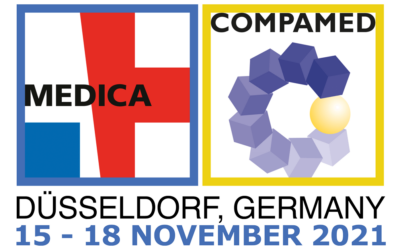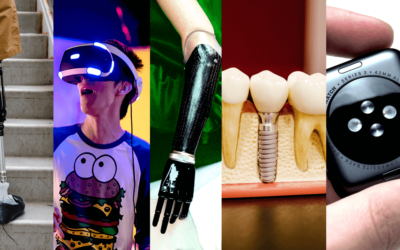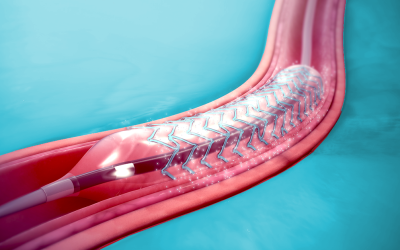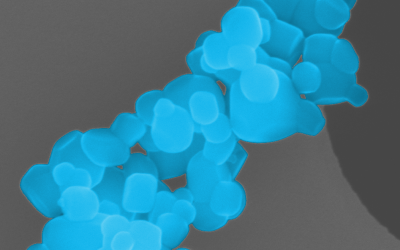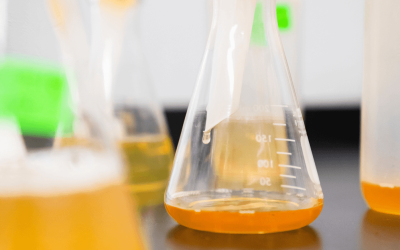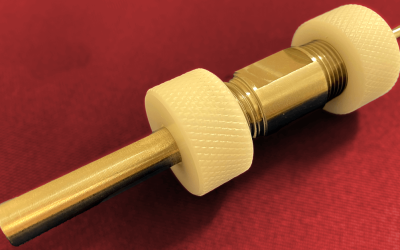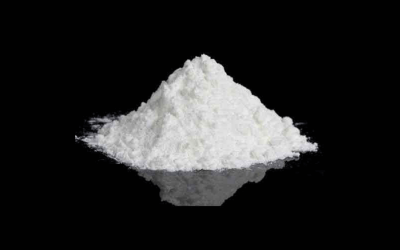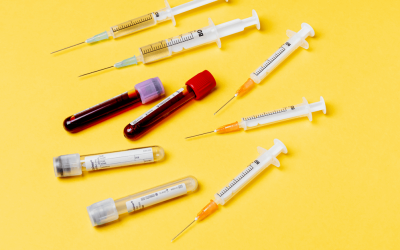Latest News
SAXOCON at the COMPAMED/MEDICA Trade Fair 2021
SAXOCON is participating at the COMPAMED/MEDICA trade fair in Düsseldorf, we will be there on November 15-17. We will have a booth at the Danish Pavilion. Come and meet us there.
Click here for more information.
Reduce Animal Testing
Every day people are exposed to chemicals from a variety of sources such as food products, cosmetics, clothing, medical devices, and medicines. EU regulations set requirements for testing chemicals for their potential to cause harm, be it through DNA damage, cancer, hormonal disruption or some other way.
Often the testing for the harmful effects of a chemical is conducted through testing on animals. While effective, animal testing suffers from grave ethical concerns around the treatment of animals. On 29 September this year, the European Medicines Agency (EMA) implemented new measures to minimise the use of animal testing in the development of medicines.
Achieving the goal of reduced animal testing requires the use of sophisticated computer modelling and the expertise to interpret the results. SAXOCON specialises in the use of Quantitative Structure-Activity Relationship (QSAR) modelling and can therefore help you to understand the potential danger of the chemicals used in your products without animal testing.
So, get compliant with EU regulations and minimise the use of animal testing with SAXOCON’s QSAR specialists.
Read more about how we can help here.
Surface Characterisation
Surfaces are everywhere, and we constantly come into contact with them. To live in this world means touching surfaces, so we rarely give it any thought. But, the things we manufacture, the things we wear on or have implanted in our bodies that we come into contact with, must be safe.
Any product marketed in the EU that comes into direct contact with skin, blood or organs; or has indirect contact via packaging or conducting air or fluids that interact with people must be CE Certified. Depending on the duration and type of body contact a product has, it must undergo a defined physicochemical, morphological, and topographical (PMT) analysis.
Correctly conducting a PMT analysis requires care and skill and is a critical step in ensuring product safety. Once completed, you will be better prepared to make well-informed decisions about your product and its readiness for the market.
SAXOCON has the expertise to help you get your products compliant and certified for sale in the EU.
Check out how we can help here.
Compliant Stents
Get your stents and implants in compliance with relevant regulations.
Stents and other medical implants come into intimate contact with the human body, sometimes over long periods or permanently. As such, they are subject to strict regulations regarding their safety. If you are a manufacturer of stents or implants and want to market them in the EU, you will need to apply for a CE Mark certificate. A CE certificate verifies that a product is safe and performs as intended. The ISO 10993-1 standard describes the requirements for evaluating and testing the biological safety of a medical device product, including physicochemical, morphological characteristics, and topographical characterization of constituent materials.
SAXOCON has the expertise to help you get your stents and implants compliant and certified for sale in the EU.
Nanomaterials in Your Products
Do you use nanomaterials in your production processes, or are they in your final finished product? If so, you are subject to EU regulations that require you to know and document your use of nanomaterials.
According to ECHA, products incorporating or consisting of nanomaterials are subject to REACH and CLP regulations. Manufacturers, suppliers, and importers must be able to identify the use of nanomaterials in their products to ensure that they meet the requirements of these regulations.
SAXOCON has the tools and expertise to identify and characterise any nanomaterials in your products. We provide you with the required documentation to get your product approved for sale in the EU.
Check out how we can help here.
Stay Compliant with ECHA Regulations
The substances of very high concern (SVHC) candidate list is constantly changing. In a recent update, eight new substances, widely used in consumer products such as cosmetics, scented articles, rubber, and textiles, were added to the candidate list for restriction in the EU because they are hazardous to human health. All suppliers of physical products in the EU market must track and report any SVHCs found in their products. This information shall be made available to consumers and waste operators by filling in the Substance of Concern in Products (SCIP) with the European Chemical Agency (ECHA).
SAXOCON can help you comply with your obligations regarding tracking your supply chain, evaluating potential SVHC, and submitting your information to ECHA.
Are Airborne Ultra-fine Particles Toxic?
Do you know what airborne particles you are exposed to and which of these particles is a health concern?
We can help you determine what is in the air you are breathing, the risks posed, and how to mitigate potential problems.
Using the method improved at DTU Nanolab, SAXOCON has designed and built a highly efficient, multi-stage impactor that collects airborne particles (down to the nanoscale) for analysis.
Check out DTU Nanolab’s article about their method here.
Our analysis of the collected particles not only quantifies their size distribution and concentration but also determines their level of toxicity.
Gain some peace of mind and find out what is happening with your air quality.
Read more about our services here.
EU no Longer Considers Titanium Dioxide Safe as Food Additive
Titanium dioxide is widely used in the EU as food colourant E171. In May, EFSA announced that titanium dioxide is no longer considered safe when used as a food additive. Recently, a similar concern has been expressed concerning its use as an additive in animal feed. The result of these findings and concerns is that an Acceptable Daily Intake (ADI) for titanium dioxide can no longer be established. If you use E171 in food or animal feed, you will need to update your product risk assessment.
EFSA news on titanium dioxide as a food additive.
EFSA news on titanium dioxide as an animal feed additive.
We can help you stay up-to-date with regulatory changes. SAXOCON provides services to monitor and assess product risk in relation to current regulations.
Read more about our food industry services here.
Is Your Biological Evaluation Supplier ISO 13485 Certified?
Are you a medical device manufacturer?
According to the new Regulation (EC) 2017/745 on medical devices (MDR), medical device manufacturers must demonstrate to notified bodies that all critical suppliers conform with the ISO 13485 standard covering quality management systems.
As a critical supplier of high-quality toxicological services, SAXOCON is ISO 13485 certified, which means that there will be one less thing to worry about at the next audit.
Having confidence in your suppliers allows you to focus on your manufacturing processes and get your products approved and ready for market as quickly as possible.
Find out how we can help you here.
Partikler i dit arbejdsmiljø
Er du den arbejdsmiljøansvarlige hos jer? Har I et værksted, en produktion eller et laboratorie? Og ved du, hvad der er i den luft, I indånder?
Der findes mange arbejdsprocesser, hvor der kan opstå fine og ultrafine partikler, som kan være farlige for jeres helbred.
Hos SAXOCON har vi den nødvendige ekspertise og erfaring til hurtigt at vurdere og løse problemer med uren luft i dit arbejdsmiljø.
Læs hvordan SAXOCON kan hjælpe jer her.
SAXOCON CTO at 2021 Cleaning Validation Conference
SAXOCON is pleased to announce that our CTO, Carsten B. Senholt, will present at the 3rd Cleaning Validation LIVE event on 3 June 2021 at 13:40.
Carsten will introduce the basic principles behind establishing Permitted Daily Exposure (PDE) and its role in supporting cleaning validation in shared facilities.
Find out more about the conference here.
SAXOCON is now ISO 13485:2016 Certified
After more than a year of dedicated effort and nearly 4.000 hours of preparation, we are proud to announce that we have received the globally recognised ISO 13485:2016 certification from BSI under certificate number MD725842.
We chose BSI as our certification partner because they are a well-known and respected provider of certification services and act as an EU notified body for medical devices under MDR/IVDR.
Being a toxicological consultancy company makes us one of only a select few that have obtained this certification.
Achieving ISO 13485:2016 certification is a major strategic milestone in providing our clients with state-of-the-art toxicological and biological safety consultancy services within a quality management context.
SAXOCON is a high-risk supplier for many of our clients and, as such, being ISO certified proves that our consultancy services are built on a foundation of quality processes, encompassing all stages of the value chain from design to final delivery.
We’re just getting started
Obtaining this certificate is not a one-off event. To continue being ISO certified, BSI will audit us on an annual basis. We have committed ourselves to continually investing in the development and improvement of our quality management system.
If you are interested in learning more about how our quality management system can support your business, please do not hesitate to reach out.
